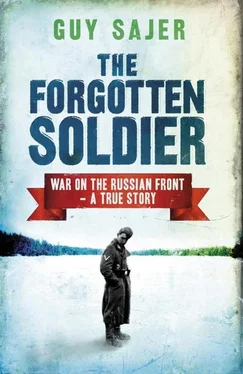By this time we had been in the station for four hours, and felt frozen. It grew colder as it grew dark, and to kill time we plunged once more into our provisions. Although it was already quite dark, traffic continued, dimly lit. Laus was beginning to look as though he had had enough. With his cap pulled down over his ears, and his collar turned up, he was tramping up and down for warmth; he must have covered at least ten miles. We had formed a small group of friends from Chemnitz, which wasn’t to break up until much later: Lensen, Olensheim, and Hals, three Germans who spoke French as badly as I spoke German; Morvan, an Alsatian; Uterbeick, an Austrian, as dark and curly as an Italian dancer, who eventually dissociated himself from our group; and me, a Franco-German. Among the six of us, we were making progress in both languages, except for that damned Uterbeick, who never stopped humming Italian love songs under his breath. These plaintive melodies sounded out of place and totally foreign to ears more accustomed to Wagner than to Italian composers, especially those lamentations of an abandoned Neapolitan swain.
Hals had a watch with a luminous dial which informed us that it was already eight-thirty. We felt sure that our departure was imminent, that they were not going to leave us on the station platform for the night. But that is how it turned out. After another hour, several men unpacked sleeping rolls and stretched out as best they could — if possible on some raised surface, for a little protection from the damp. Some even had the temerity to sleep under the train, hoping that it wouldn’t start rolling.
Our sergeant had settled on a pile of railway baggage and lit a cigarette. He looked worn out. We simply couldn’t accept the idea of a night out of doors. It seemed impossible that we would be left where we were. We knew that the departure whistle would blow soon, and that all the idiots who hadn’t had the patience to wait would have a fine time packing up their bedrolls in a hurry. As it turned out, we would have done better to imitate them and gain two hours’ sleep; two hours later we were still sitting on the cold stones of the road bed. It was growing steadily colder, and a fine rain had begun to fall. Our sergeant was busy building himself a shelter with the railway baggage — not at all a bad idea. When he covered this over with his waterproof sheet, he was completely sheltered — the old fox.
We now felt compelled to find ourselves some shelter too. We couldn’t move too far from our weapons, but we left them nonetheless, with their barrels in the air, open to the rain, expecting a royal dressing down later on. The best places, of course, were taken by this time, and the only thing we could think of was to shelter beneath the railway cars. It had certainly occurred to us to try to get inside, but the doors were held shut with wire cables.
Full of complaints, we crawled into our disquieting and altogether relative shelter. The rain blew in sideways after us, and we were furious. Later on this anger made me laugh….
As best we could, we arranged some degree of shelter from the rain. This was my first night in the open air, and needless to say I never shut my eyes for more than fifteen minutes at a time. I can remember long periods of staring at the huge axle that served as the roof of my bed. Through my exhaustion it often seemed to be shifting, as if the train were about to move; I would wake with a start to find that nothing had changed, fall back again into a half sleep, only to be startled back into wakefulness once again. At the first glimmer of daylight we left this chance resting place, stiff and numb, looking like a gang of disinterred corpses.
We fell in at eight o’clock, and marched to the embarkation platform. Hals remarked several times that we could perfectly well have spent another night at the castle. None of us as yet had any idea of the dispiriting necessities of military life in wartime. This had been our first night out of doors, but we were destined to spend many others which were far worse.
For the moment, we were train guards. Our company had been divided among three long convoys of military materiel, two or three to a car. I found myself with Hals and Lensen on a flatcar which carried airplane wings marked with a black cross, and other parts covered by canvas. These were supplies destined for the Luftwaffe; according to the inscriptions we had been able to read, they came from Ratisbonne, and were going to Minsk.
Minsk: Russia. Our mouths suddenly went dry.
We were pursued by bad luck. We were stuck on an open car; the rain had turned to snow; the unbearable cold was intensified by the motion of the train. After due consideration we ducked under the tarpaulin which covered a large DO-17 engine. This maneuver cut the wind, and by clinging together we managed to achieve a semblance of warmth.
We stayed there a good hour, roaring with laughter over nothing. The train was rolling along and we hadn’t the slightest idea what was happening outdoors. From time to time we could hear trains going in the other direction.
All of a sudden, Lensen thought he heard a voice shouting above the noise of the wheels. Carefully he stuck his head out of our shelter. “It’s Laus,” he said calmly, turning back to us and pulling the canvas down again.
Ten seconds later, the canvas was ripped back to reveal the sergeant fuming with rage at the sight of our three happy faces. Laus, wearing a helmet and gloves, looked very much on the job. His face and coat were powdered with snow, like the rest of the train, whose long profile joggled and swayed behind him. The air rang with a loud “Achtung!” but the spasmodic motion of the train prevented the order from being executed with its customary stiff precision.
The scene which followed was worthy of burlesque. I can still see that great teddy bear Hals, swaying from right to left as he tried to maintain a rigid posture. As for me, my long coat had caught on one of the numerous sections of airplane engine, which made it impossible for me to straighten up. Laus was no better than we were at maintaining a dignified attitude. Finally, beside himself with exasperation, he braced himself with one knee against the floor. We followed his example, and from a certain distance we might have been taken for a quartet of conspirators whispering secrets. In fact, I and my companions were receiving a magisterial dressing-down.
“What the hell do you think you’re doing under there?” Laus shouted. “Where in God’s name do you think you are, and what do you think you’re supposed to be doing on this train?”
Hals, who had a spontaneous nature, interrupted our superior. He said that it was impossible to stay outside the canvas because the cold was so bad, and that anyway there was nothing to look at.
It would seem that by making these observations, Hals was demonstrating a total lack of objectivity. Like an enraged gorilla the sergeant seized our comrade by the collar and shook him violently, with a torrent of abuse.
“I’ll make my report! At the first stop I’ll have you sent to a disciplinary battalion. This is nothing less than abandoning your post. You could get the firing squad…. What if a car had blown up behind you? You couldn’t have warned anyone from that hole of yours!”
“Why?” Lensen asked. “Is a car going to blow up?”
“Shut up, idiot! There are terrorists all along the line, ready to risk anything. When they don’t blow the trains right up they throw explosives or incendiaries. You are here precisely to prevent that sort of thing. Take your helmets and come to the front of the car, or I’ll throw the whole lot of you overboard!”
We didn’t wait for him to repeat himself, and despite the cold which bit into our faces, we took up the positions he appointed. Laus continued forward through the loaded cars, hanging on as he moved from one to the next. He wasn’t really a bully, but a man with a clear idea of a job to be done. I never saw him try to make things easier for himself, which is probably why I felt he must have a sympathetic streak, although I hadn’t yet spoken to him. None of the other feldwebels in the company were so strict; they claimed to be saving themselves for the big job; but when the moment came Laus did as much as they, if not more. He was the oldest of the sergeants; perhaps he had already been at the front. In fact, he was like every sergeant-major in the world: afraid of responsibility, and at the same time giving us a hard time.
Читать дальше












